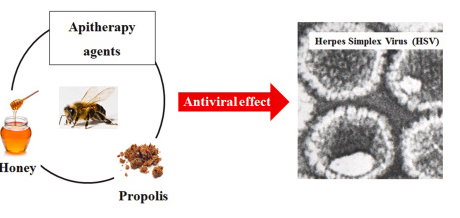Monday, January 24, 2022
Azerbaijan Propolis May Help Treat Moderate-Severe Depression
Propolis add-on therapy alleviates depressive symptoms; A randomized placebo-controlled clinical trial
Phytother Res. 2022 Jan 24
Almost half of the treatments with common antidepressants are failed or result in a relapse of symptoms after cessation. Moreover, the antidepressants side effects rationalize the use of complementary medicine as an adjunctive therapy.
This study aimed to evaluate the efficacy and safety of propolis in complementary therapy of depressive disorder. Chromatography technics were used to detect propolis components. A double-blind, randomized, placebo-controlled trial was designed, and 54 participants were randomly assigned to receive either propolis or Placebo for 6 weeks.
Treatment was defined as a decrease in 17-item Hamilton Depression Scale (HAMD-17) and Beck depression inventory (BDI). On D42, there was a significant reduction in HAMD score in the propolis group compared with the placebo group (p < .0001). HAMD score significantly decreased in the propolis group from 20.92 ± 3.77 on D0 to 10.03 ± 5.55 on D42, and BDI score was improved from 29.25 ± 3.06 on D0 to 14.17 ± 4.86 on D42.
Our findings confirmed that complementary treatment of propolis with SSRIs could safely attenuate symptoms of moderate-severe MDD. These antidepressant effects might result from the rich phenolic acids and flavonoids content of Azerbaijan propolis.
Labels:
Propolis
Thursday, January 20, 2022
When will we see bee therapy in Australia?
Apitherapy is a branch of medicine alternative medicine that uses honey bee products.
Australia is yet to introduce bee therapy, but Bridgett states there are “many benefits”.
Friday, January 14, 2022
Research: Bee Pollen is a Source of Antioxidants and Antimicrobials
Screening of Plant Pollen Sources, Polyphenolic Compounds, Fatty Acids and Antioxidant/Antimicrobial Activity from Bee Pollen
Molecules 2022, 27(1), 117
In this study, the botanical origin, total flavonoid and phenolic content, antioxidant activity, phenolic profile and fatty acid composition of mixed bee pollen loads collected in Bayburt, Turkey, were determined.
In addition to these assays, antibacterial activity of bee-collected pollen extract (BCPE) against a variety of food-borne pathogenic bacteria was determined in vitro. Pollen loads were classified into five botanical families based on their color: Asteraceae, Fabaceae, Campanulaceae, Cistaceae and Rosaceae.
Total flavonoid, total phenolic, CUPRAC and CERAC concentrations were 173.52 mg GAE/g, 79.21 mg QE/g, 85.59 mg Trolox/g and 118.13 mg Trolox/g, respectively. Twenty-three phenolic compounds were scanned in bee pollen extract by LC-MS/MS, with rutin being the most abundant. Cis-4,7,10,13,16,19 docosahexaenoic acid was the predominant fatty acid, followed by cis-11-eicosenoic acid, palmitic acid, and alfa linolenic acid.
In addition, the agar well diffusion (AWD) and micro-broth dilution methods were used to determine of the antibacterial activity of the BCPE sample. MIC values were observed to vary between 2.5–5 mg/mL for Gram-positive bacteria and 5–10 mg/mL for Gram-negative bacteria.
These findings indicate that bee pollen could be a potential source of antioxidants and antimicrobials.
Labels:
Bee-Collected Pollen
Wednesday, January 05, 2022
Propolis and Honey Better Than Acyclovir for Treating Cold Sores and Genital Herpes
Effect of honey and propolis, compared to acyclovir, against Herpes Simplex Virus (HSV)-induced lesions: A systematic review and meta-analysis
J Ethnopharmacol. 2021 Dec 26;287:114939
Ethnopharmacological relevance: Apitherapy is a branch of traditional medicine that uses bee products to manage numerous diseases. In this context, the antiherpetic effect of these bee products has been demonstrated in some studies with some controversial results.
Aim of the study: Thus, we conducted a systematic review and meta-analysis to compare the effectiveness of honey and propolis with acyclovir, the reference drug, in the treatment of cold sores and genital herpes.
Materials and methods: The selection of eligible studies was conducted through the search in Pubmed/MEDLINE, Scopus, Cochrane Library, LILACS, and Electronic Scientific Library.
Results: The search yielded 147 articles, of which nine were considered eligible for analysis. The analysis of these studies showed that the healing property of propolis is superior to that obtained for acyclovir (95% CI: 2.70 to 8.25; p = 0.0001). Furthermore, honey also presented a better healing effect than acyclovir against Herpes simplex virus-induced wounds (95% CI: 3.58 to -0.19; p = 0.03), inducing complete re-epithelization of herpetic lesions after 8 days, while for acyclovir, the healing time average was 9 days. It also provoked a similar reduction of pain caused by herpetic compared to acyclovir (95% CI: 2.27 to -0.42; p = 0.18).
Conclusions: Overall, these results confirm the use of honey and propolis as potent antiherpetic agents.
Tuesday, January 04, 2022
Report on the Health Benefits of Bee Products in Boosting Immunity; Treating Cancer, Diabetes, High Cholesterol, High Blood Pressure, Allergies
J Agric Food Chem. 2022 Jan 2.
Beside honey, honeybees (Apis mellifera L.) are able to produce many byproducts, including bee pollen, propolis, bee bread, royal jelly, and beeswax. Even if the medicinal properties of these byproducts have been recognized for thousands of years by the ancient civilizations, in the modern era, they have a limited use, essentially as nutritional supplements or health products. However, these natural products are excellent sources of bioactive compounds, macro- and micronutrients, that, in a synergistic way, confer multiple biological activities to these byproducts, such as, for example, antimicrobial, antioxidant, and anti-inflammatory properties.
This work aims to update the chemical and phytochemical composition of bee pollen, propolis, bee bread, royal jelly, and beeswax and to summarize the main effects exerted by these byproducts on human health, from the anticancer and immune-modulatory activities to the antidiabetic, hypolipidemic, hypotensive, and anti-allergic properties.
Labels:
Bee-Collected Pollen,
Beeswax,
Honey,
Propolis,
Royal Jelly
Subscribe to:
Posts (Atom)




